Bobby Miller's Blog, page 4
October 1, 2024
Coppola wins
Within minutes of Megalopolis, I sank into my seat.
Oh boy, I thought. Francis Ford Coppola’s decades-long passion project wasn’t going to be good.
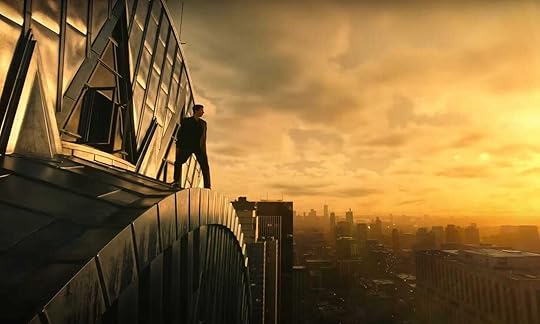
I was at a packed Alamo Drafthouse screening of the self-financed 120 million-dollar film, and everyone was quietly respectful. Perhaps to a fault. Part of me believes Francis wanted us all to have more fun.
I amassed a crew of ten to see it, and while no one could honestly call it "good" afterward, we all loved talking about it over drinks. In fact, it was maybe the most lively conversation about a movie I've had in years.
Yes, the film is crazy. Sometimes stilted and sincere, sometimes outlandish and cartoony. But it's never boring. The two hours and eighteen-minute running time never felt like a slog.
Can you say that about most superhero movies?
And the crazy thing? The conversation has spilled into several text threads.
I can't stop thinking about the film, and it's making me wonder if I actually like it?
Sure. You could say that this has the makings of a cult film. A "so bad it's good" movie. A guilty pleasure.
But most "guilty pleasures" come from people who aspire to greatness.
Coppola once said that it's criminal to be pretentious. But that one must swing for the fences. To say fuck it.
For a world that seems more anti-corporation than ever, I find it odd how many people are delighted by Megalopolis's poor box office performance. An original big budget film with no corporate backing.
Here is one of America's finest living artists, putting his money where his mouth is and realizing a passion project at the age of 85.
The headline shouldn't be about how much money the film made.
The headline is that it exists.
Say what you will about the movie, but know that Coppola, the idealistic artist, the one striving to make an original film in a corporatized hellhole—
has won.
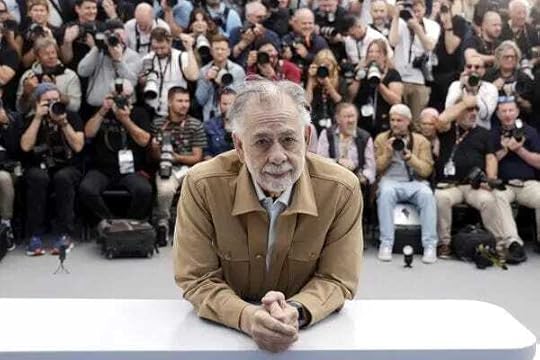
Thanks for reading Bobby Miller Time! Subscribe for free to receive new posts and support my work.
September 20, 2024
INTERVIEW: Filmmaker Justin Johnson's Nipple Factory
I’ve known Justin Johnson (AKA JUSTINSUPERSTAR) for close to 15 years now. I met him in the early days of the internet, the pre-YouTube era, when a handful of young filmmakers posted short films online. We were “online friends” for a while until I moved to NYC, and he invited me to work for Next New Networks, a pioneer in short-form internet video. It’s where I won two Webby awards and became a D-list internet personality!
But listen, this isn’t about me.
It’s about Justin, who had a large hand in my D-list internet celebrity! And who has been making documentaries since I’ve known him. His second feature-length film is MOM & DAD’S NIPPLE FACTORY.
The film follows Justin’s conservative Christian parents' secret prosthetic nipple business for people who have gone through breast cancer.
And listen, jerks, it’s one of the year's best documentary films. That’s right. It’s getting the coveted Bobby Miller seal of approval. A concept I may or may not have just made up.
Watch the trailer below and join me for a friendly interview.
Years ago, you pitched me the idea for your doc. Even back then, you knew it would called "Mom and Dad's Nipple Factory." I remember you asking if you should make it, and I said, "Dude, you have to, based on the title alone.” Can you talk about its beginnings? I feel like you had some resistance to making it at first.
Yes. It's a very personal story that started as a short film. As a short, it was a lot easier to pitch to my parents because I told them it'd be five to eight minutes and would just take a few weekends. Really, because my dad is so quiet and so shy, I didn't expect him to even talk.
And I shot a little bit with my parents and I just couldn't figure it out and I think that Bobby, our conversation, I'm sure was early on. And I remember being at film festivals in 2015 talking about this... In 2017, I was at film festivals talking about this. And people... Same thing. I tell them the pitch, I tell them about my parents' business, and then they would be like, "Oh, you have to do this, you have to finish this."
Once I figured out that it was really about my parents' love story, I cracked the code, and it became something bigger and more universal.
But I was probably, I guess a little bit reluctant. It's hard to remember because that was 2015. So, gosh, almost 10 years ago. And I was nervous to talk about it for sure, but I think I hadn't found the heart of it yet and so once I found the heart, then it was a lot easier.
When you mention the C word, a lot of people tense up, either because cancer has affected them or because they just don't want to think about it. Your documentary does the tricky thing of presenting this story with tremendous heart and humor. It never feels heavy. In fact, it’s really aspirational. Knowing your work, this doesn't surprise me, but did you have any trouble finding the tone or deciding what to keep in or take out?
Initially, it felt more art house, and I would do these things called video blogs, which would be arty with lots of slow motion and electronic music. So, I had some early cuts that were a lot more vibey, I think. Once I started working with this great producer, Jason Cohen, one of the things that he really recommended to me was, "Hey, people are going to make assumptions about Wisconsin. We really got to have a country influence." He also wanted to push the humor of the situation a little bit more.
And I think from a musical element, it was important to have something that felt a little bit country. And honestly, the soundtrack part of it was one of my favorite things because we were able to build this soundtrack that has guitar and theremin, which is this quirky electronic music instrument, and so theremin represented my dad's experimental side, and then the country was this backbone of Midwest, what people would expect of it.
The soundtrack is available on Spotify for free BTW.

I admire documentary filmmakers because, for me, the question is, when are you done? Like, when is the movie done? With narrative, there are all of these pragmatic considerations, things that need to be done by X date. But, with a documentary, you could still be shooting this thing. I saw a cut of the film, pre-pandemic, that I thought was pretty damn strong. And yet, you still went in and kept shooting and retooling. Can you talk about that process? When the heck do you know when you're done?
I'm sure that, Bobby, you probably saw a more vibey cut of it, honestly, because that would've been before Jason was really super involved. I always had a particular vision of what the film was, and there were a few pieces that really were the last pieces of the film that I think were really important, and that was the interview with Dr. Curry, their doctor who was in Florida, and he was really hard to track down.
We tried for years to get him to respond to emails, and he is a busy guy. And finally... I was like, "I'm just going to try one more time to get ahold of this guy." And we finally did, and it was amazing. We had a remote crew go down to Florida to film with him, and the amount of energy that he brings to the film just because you have this stoic Midwestern characters, and then you have this guy who's bigger than life, and he's in Florida, and it really brings that element of, "An expert is weighing in and saying it's good."
I knew it was going to be really tough to have a full film without that expert voice saying, "Yep, they knew what they're doing. This is good. I was impressed." So that was a big part of it, and it took a while.
And then the other part was these before and after type scenes of my parents' customers. I think we put up some postings in Los Angeles. It's a strange ask, but once they knew the heart behind the film, it really made a big difference.
With those two additional elements, I felt like we had a full and rounded story.
Your folks are conservative, and I found how you handled their faith very refreshing, especially at a time when the country is so divided. How did you approach this aspect of the film?
I wanted it to be very light touch, and I didn't want it to seem like I was making fun of them because I really think, of course, my parents' faith is such a huge part of their lives, and I never wanted to be mocking or poking fun at it. For this film to succeed, it really needed to be something that could be appreciated by both sides, and I think there is an interesting aspect where I definitely get some questions at Q&As where people say, "Oh, well, what's your spiritual journey like, Justin?"
And so I like the fact that people think that maybe I would go back to the faith as a part of this, but I'm glad it's ambiguous. I wanted it to be a celebration of Midwestern people who get stuff done and don't ask for a lot in return. And I wanted it to be something where, "Hey, there's parts of it that I think are funny," Like my mom singing Happy Birthday to Jesus on Christmas. I think that's funny, and I laugh a little bit, but different audiences react in different ways, and I think that's just a really important line for us to tread.
Honestly, I think art that treads this line may be the most interesting at this juncture in time.
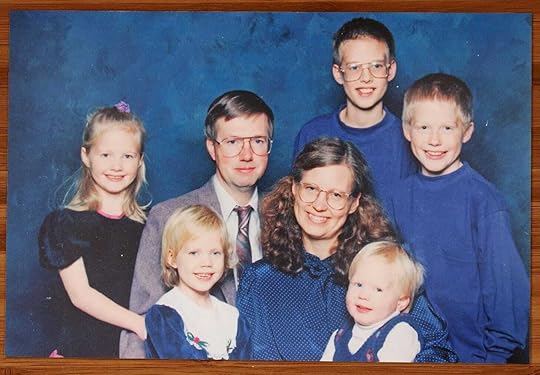
You've toured the film nationwide at many wonderful film festivals. What’s been the reaction to the film? Did certain states react in different ways?
I found that it was less about different states acting in different ways. I think if we would've screened in Europe, it would've been a really interesting reaction, because obviously their attitude towards the female nipple and toplessness and that kind of thing is a lot different in certain parts of Europe, of course, than America.
We screened in San Francisco and we've screened in Milwaukee and all over the place, and I really think that the reactions are pretty consistent, which I think is nice. We did get a pretty incredible response in Milwaukee because it is this hometown story.
We’ve also been able to do screenings with cancer foundations, and those were some of the most powerful reactions that I've ever heard to the film. I think it was very cathartic for them.
But I'm thankful that generally we get laughs and we get tears and pretty consistently, no matter where it's at.
It’s a great film and I encourage everyone to check it out. You can rent/own it on all platforms. Check NippleFactoryFilm.com
Thanks for reading Bobby Miller Time! Subscribe for free to receive new posts and support my work.
August 14, 2024
The Animation Guild's Last Stand
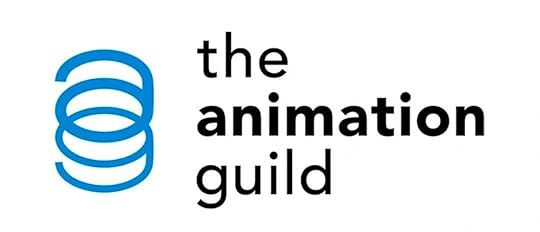
I have a lot of animator friends. They’re the sweetest folks you could ever meet. Hell, I married one! But it’s that inherent sweetness that has been taken advantage of for decades.
Animation is a hugely profitable business. This year alone, we have seen the highest-grossing animated films and the most streamed shows.
And yet, this is the worst time I’ve ever seen for animation workers.
One animator friend in his forties said, “It feels like I’m just graduating college, accepting whatever industry-adjacent job I can.”
Another was worried about the amount of work shipped overseas, the elimination of key roles, and the fact that AI is already replacing artists.
These are familiar concerns for anyone in WGA or SAG. But, the disparity between those unions and the animation guild is alarming.
The WGA strike last year illuminated this:
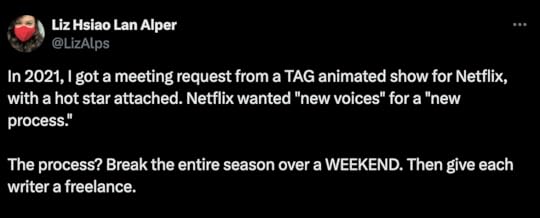
There are many social media posts like this, but what I found most shocking was the reaction to them. Many people didn’t know how big a gulf there was between WGA and TAG-covered shows.
Here’s a hypothetical:
Say you create a beloved TAG animated show.
And let’s say, I dunno, it went for four seasons.
I’m just saying hypothetically!
Did you know…No matter how successful it is or how often it’s broadcast/streamed/purchased in the US and abroad, you won’t see a dime? Unlike the WGA, there are no residuals for writers or show creators in the animation guild.

OKAY. I know what you’re thinking…
Boo Hoo for the .01% of lucky folks who get their show on air. What about everyone else?
Everyone else is either treating animation as a side gig, changing careers, or just leaving town!
And yet, the money continues flowing to the corporations.
Will the tide turn? Last week’s rally suggests maybe.
But, as the union enters its first week of negotiations, I have one piece of advice:
Stop being so damn nice.
July 15, 2024
On Trump's Assassination Attempt

On Saturday, I arrived at the community pool with one goal in mind: digital detox. I left my phone in the car and played with my 3-year-old son. Eventually, I swapped with my wife and sat by the pool, enjoying my freedom from the doom scroll.
But then, I heard whispers.
Trump had been shot.
I asked a woman for clarification, and she showed me the front page of the New York Times. It was Trump, direct-to-camera, blood shooting from his mouth. He looked dead. Killed on impact.
I started shaking.
Yes, I hated the guy at various points in my life. And yes, I sometimes wished for this day (ideally from natural causes). But when confronted with that morgue shot, I recoiled in horror, my stomach in knots.
“Fuck,” the woman said, “Now I have to download Twitter again.”
I scrambled back to my car, searching for my phone. Desperate. By the time I found it, the narrative had already shifted.
New photos revealed the bullet’s true path.
The shot missed.
When I return to the pool, most families seem blissfully unaware. But there are pockets of folks finding out.
On Twitter, the jokes come fast and furious. How could the shooter miss? They had just one job! Etc. Etc.
The woman near me says, “They’re going to make him a martyr,” and shows me a screengrab of Marco Rubio proclaiming God saved Trump.
The lifeguard says, “He just won the election.”
I see my wife playing with our son, and I decide she should enjoy not knowing for a bit longer.
I doom scroll, and I’m adrift in a gurgling cauldron of emotions.
Hot takes, conspiracy theories, and jokes. Everything feels refracted and reflected. It’s so much so that my own interior feels like a funhouse mirror.
I literally have no idea how to feel.
By nighttime, I’m a collection of my news feeds and social media algorithms. I’m drinking beer, swirling.
I give the boy a bath and doom scroll behind the ceramic tub. He can’t see, but I can.
The news reports that the shooter was 20 years old. A kid. He had had no clear manifest, no ideology.
Good, I think. We don’t deserve any easy answers.
Another report. A father has died, shielding his family from the bullet meant for Trump.
I think of the countless American mass shootings, and finally, my feelings collide into something unified - despair.
I remember all the elementary children in Uvalde, Texas.
I decide to turn off my phone. Try to absorb my child’s glee as he talks about all the fun he had in the pool.
By the time he’s asleep, I’m thinking about my book. I can’t help it. I’m a self-absorbed artist. I think about that version of America — the comic dystopia. How quaint.
I’ve always taken a strange comfort in knowing I can turn anything into comedy. It’s my way of dealing with the world, a defense mechanism. But after Saturday, I find myself grasping for anything funny.
On American Violence, etc.

On Saturday, I arrived at the community pool with one goal in mind: digital detox. I left my phone in the car and played with my 3-year-old son. Eventually, I swapped with my wife and sat by the pool, enjoying my freedom from the doom scroll.
But then, I heard whispers.
Trump had been shot.
I asked a woman for clarification, and she showed me the front page of the New York Times. It was Trump, direct-to-camera, blood shooting from his mouth. He looked dead. Killed on impact.
I started shaking.
Yes, I hated the guy at various points in my life. And yes, I sometimes wished for this day (ideally from natural causes). But when confronted with that morgue shot, I recoiled in horror, my stomach in knots.
“Fuck,” the woman said, “Now I have to download Twitter again.”
I scrambled back to my car, searching for my phone. Desperate. By the time I found it, the narrative had already shifted.
New photos revealed the bullet’s true path.
The shot missed.
When I return to the pool, most families seem blissfully unaware. But there are pockets of folks finding out. Surreal.
On Twitter, the jokes come fast and furious. How could the shooter miss? They had just one job! Etc. Etc.
The woman near me says, “They’re going to make him a martyr,” and shows me a screengrab of Marco Rubio proclaiming God saved Trump.
The lifeguard says, “He just won the election.”
I see my wife playing with our son, and I decide she should enjoy not knowing for a bit longer.
I doom scroll, and I’m adrift in a gurgling cauldron of emotions.
Hot takes, conspiracy theories, and jokes. Everything feels refracted and reflected. It’s so much so that my own interior feels like a funhouse mirror.
I literally have no idea how to feel.
By nighttime, I’m a collection of my news feeds and social media algorithms. I’m drinking beer, swirling.
I give the boy a bath and doom scroll behind the ceramic tub. He can’t see, but I can.
The news reports that the shooter was 20 years old. A kid. He had had no clear manifest, no ideology.
Good, I think. We don’t deserve any easy answers.
I think of the countless American mass shootings, and finally, my feelings collide into something unified - despair.
I remember all the elementary children in Uvalde, Texas.
I decide to turn off my phone. Try to absorb my child’s glee as he talks about all the fun he had in the pool.
By the time he’s asleep, I’m thinking about my book. I can’t help it. I’m a self-absorbed artist. I think about that version of America — the comic dystopia. How quaint.
I’ve always taken a strange comfort in knowing I can turn anything into comedy. It’s my way of dealing with the world, a defense mechanism. But after Saturday, I find myself grasping for anything funny.
July 10, 2024
Announcing SITUATION NOWHERE, my first novel
Hi friends,
An exciting announcement.
My first book, SITUATION NOWHERE, will be published by Maudlin House in March 2025. Below is the Publisher's Marketplace announcement.

And if you’re wondering what mash-up means, expect comedy, satire, science fiction, horror, and everything in between!
Thank you, Mallory Smart and Maudlin House!
I have more people to thank and things to say about writing my first book. And I can't wait to share it all with you, EXCLUSIVELY ON THIS SUBSTACK, as we get closer to the release date. Also, there might be a limited edition version of the book, so definitely subscribe to the old substack (form below!) to be first in line for pre-orders.
Until then, check out my first substack post, which details my journey toward this day.
<3
Bobby
Thanks for reading Bobby Miller Time! Subscribe for free to receive new posts and support my work.
July 1, 2024
Can a dumb phone save us from AI?
Last year, I sort of lost my mind over generative AI. I was writing about it a lot. Too much? And by year’s end, I pledged to back away from writing about the topic.
I reasoned that if I didn’t engage with the tech, if I didn’t feed the beast, I could sleep at night. But recently, it seems increasingly difficult to opt-out. No matter what I do, I’m feeding someone’s large language model, whether it’s Google, Meta, or Microsoft.
In early June, Apple announced it was partnering with OpenAI. And it sent me spiraling again.
It was a bold move from Apple, considering how bullish they’ve been about using the word “AI.” Last year, Tim Cook took great pains to use the phrase “machine learning” during presentations.
But, Wallstreet gonna Wallstreet, and here we are.
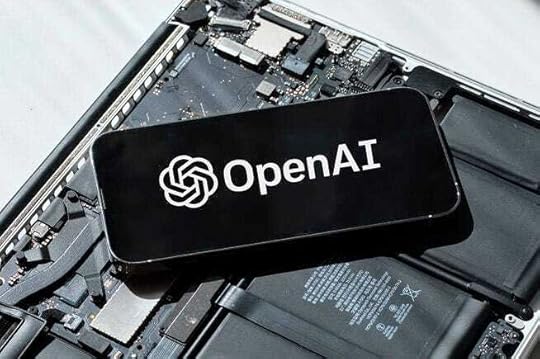
Apple represents an aesthetic ideal for many artists. Hell, I'm old enough to remember the days when the company actively courted us! And sure, they've made mistakes in the past. I was able to deal with the dumb "touch bar," the dongles, Final Cut X. But this pivot to generative AI feels...different.
So, where does this leave me and the growing number of others who are allergic to AI? How do we opt-out anymore, especially when Tech leaders like Microsoft’s CEO Mustafa Suleyman admit they view all our work as “free” to scrape?
As if on cue, the Light Phone 3 was announced the day after Apple’s reveal.
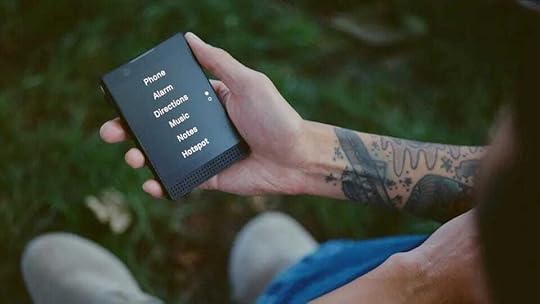
My hand-wringing to go minimal is well documented here and here. And I’ll admit, for years, switching to a dumb phone felt like an idle threat. But now, the decision feels elemental. Necessary. The only way to escape AI, algorithms, and doom-scrolling brain rot.
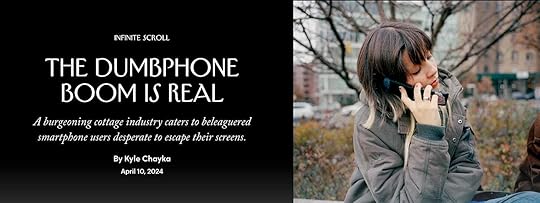
Tech companies want us to believe that AI adoption is inevitable. They’re moving so fast, draining resources in an unsustainable way, all because they want to outrun the courts and public opinion. It’s sweaty and desperate. A move made by folks who’ve bet the house on this tech.
But just because Silicon Valley has made this colossal gamble doesn’t mean we have to get into the casino, too. There are still ways of opting out, but it involves rethinking our lives.

After several weeks of contemplation, I pre-ordered the Light Phone 3.
I know that having a dumbphone will be challenging, and I’ll have to find workarounds for certain shortcomings. But at this point, what is the alternative?
Our smartphones have become increasingly toxic, robbing us of so much of our time. And now they want all our data, all our work. They’ve come for our soul.
I'm out.
Thanks for reading Bobby Miller Time! Subscribe for free to receive new posts and support my work.
Is it even possible to opt-out of AI?
Last year, I sort of lost my mind over generative AI. I was writing about it a lot. Too much? And by year’s end, I pledged to back away from writing about the topic.
I reasoned that if I didn’t engage with the tech, if I didn’t feed the beast, I could sleep at night. But recently, it seems increasingly difficult to opt-out. No matter what I do, I’m feeding someone’s large language model, whether it’s Google, Meta, or Microsoft.
In early June, Apple announced it was partnering with OpenAI. And it sent me spiraling again.
It was a bold move from Apple, considering how bullish they’ve been about using the word “AI.” Last year, Tim Cook took great pains to use the phrase “machine learning” during presentations.
But, Wallstreet gonna Wallstreet, and here we are.

Apple represents an aesthetic ideal for many artists. Hell, I'm old enough to remember the days when the company actively courted us! And sure, they've made mistakes in the past. I was able to deal with the dumb "touch bar," the dongles, Final Cut X. But this pivot to generative AI feels...different.
So, where does this leave me and the growing number of others who are allergic to AI? How do we opt-out anymore, especially when Tech leaders like Microsoft’s CEO Mustafa Suleyman admit they view all our work as “free” to scrape?
As if on cue, the Light Phone 3 was announced the day after Apple’s reveal.

My hand-wringing to go minimal is well documented here and here. And I’ll admit, for years, switching to a dumb phone felt like an idle threat. But now, the decision feels elemental. Necessary. The only way to escape AI, algorithms, and doom-scrolling brain rot.

Tech companies want us to believe that AI adoption is inevitable. They’re moving so fast, draining resources in an unsustainable way, all because they want to outrun the courts and public opinion. It’s sweaty and desperate. A move made by folks who’ve bet the house on this tech.
But just because Silicon Valley has made this colossal gamble doesn’t mean we have to get into the casino, too. There are still ways of opting out, but it involves rethinking our lives.

After several weeks of contemplation, I pre-ordered the Light Phone 3.
I know that having a dumbphone will be challenging, and I’ll have to find workarounds for certain shortcomings. But at this point, what is the alternative?
Our smartphones have become increasingly toxic, robbing us of so much of our time. And now they want all our data, all our work. They’ve come for our soul.
I'm out.
Thanks for reading Bobby Miller Time! Subscribe for free to receive new posts and support my work.
June 12, 2024
INTERVIEW: Writer Joshua Chaplinsky on his surprisingly funny Serial Killer book
As a lifelong Kanye West apologist, Joshua Chaplinsky first came to my attention with his novella, “Kanye West – Reanimator.” A funny, entertaining read that mashes Kanye West with Lovecraft. His latest book, “Letters to the Purple Satin Killer” is set to release on August 6th by Clash Books. (You can Pre-order here.)
The book is based on one of Joshua’s short stories. It tells the tale of Jonas Williker, a sadistic serial killer, through the lens of the hundreds of letters sent to him in prison. The result is a page-turner that is surprisingly funny and moving. I loved it.
Here’s my chat with Joshua:
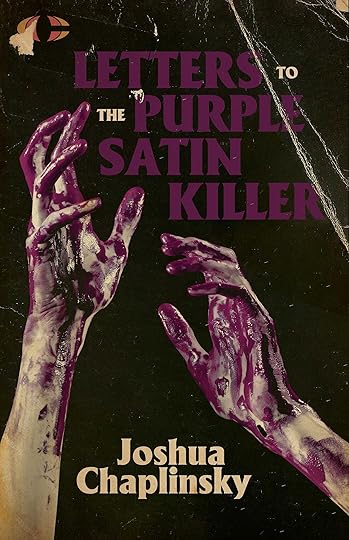
The entire story is told through letters sent to serial killer Jonas Williker. One of the book's magic tricks is that Jonas feels very vivid despite never living in his POV. I imagine that as a writer, you probably had some anxiety about the format working when you started. Was there a moment in the process when you thought, "Okay, this is going to work!"
Maybe when I first started writing the short story there was some doubt. But by the time I'd committed to expanding the idea into a novel I was pretty confident in the format. In fact, looking back at the short story now, it feels under-developed to me. Like the germ of a good idea.
Did the character of Jonas come to you first, or the letter-writing conceit?
Definitely the letter writing conceit. And after that came the characters doing the actual writing. It's really their story. Jonas's characterizaion is just a byproduct of that. The more defined they became, the more defined he became by association.
I found the book pretty damn funny. And it reminded me of American Psycho, how you'd laugh one minute and be incredibly disturbed by a violent act the next. How did you go about this balancing act?
I knew going in that if I wanted people other than depraved sickos like myself to connect with this book, it had to be well-rounded. There had to be levity and emotion to balance out the shocks. Personally I don't find the book to be that dark or violent, but maybe in this case I'm not the best judge. When family members ask if they'll like it, which is code for "how off-putting is it?", I usually say something like, oh, it's not that bad, and then my wife gives me a look like, what, are you crazy?
I want to backpedal a little on the American Psycho comparison. My wife still hasn't finished that book because of the sexual violence. And I think she won't have that problem when she reads your book. My first instinct was to call the book a comedic "true crime" story.
Yeah, I don't think LTTPSK is that hardcore, especially where sexual violence is concerned. I tried not to linger on that stuff. There's definitely a lot of black humor in the book and I think that helps sugarcoat the violence in a way. It wasn't necessarily a conscious choice; the tone was born out of the satire. It's what works for the story.
In the film world, I've had trouble getting horror stuff made because my films have a comedic bent. Are there any limitations with the horror lit genre, or does it feel wide open to you?
I'm surprised to hear you've had trouble getting comedic horror made.
Oh, it’s very much a thing. Financiers LOVE straight-ahead horror but get squirrely around anything that could be marketed as “comedy/horror.”
As for the part that comes after the book is written, I feel like I'm still at a level where anything goes? CLASH had expressed interest before the book was finished, so I didn't feel any pressure there. I just knew the final product had to be good. I tend to write in a bubble. Worrying about expectations is for successful writers! I did recognize that I had a pretty good hook, though—the whole serial killer/epistolary thing—and that I should lean into it. Other than that, it's all about getting my book on as many people's radars as possible.
The mom character is probably my favorite. Funny and tragic. Having to negotiate the fact that you raised a serial killer, trying to keep a pleasant, upbeat attitude in the face of it all. Was she based on anyone in particular?
Well, I don't want to get myself into trouble here, so let's just say she's based on a very specific mom archetype, sort of an "every mom." That doting, "my child can do no wrong," side that exists in all mothers, taken to the extreme. But yeah, I know a few moms like that in real life.
I won't spoil it here, but the book's ending is really effective. There's a surprising emotional resonance to it. Dancing around it as much as we can, did you have that ending in mind from the beginning?
Not the specifics of it, other than the inevitable punitive outcome, which isn't a part of the narrative I try to hide. But a lot of the emotional beats, yeah, I discovered along the way, in the writing. The stuff with Jonas's mother. The more that developed, the happier I became with the final product, which goes back to your question about knowing if the story was going to work. That's when I really knew.
The book is being published by Clash. I believe this is your third book with them? Can you talk about that relationship?
CLASH is great. The whole process with them has been so laid back and easy. I feel incredibly lucky that they continue to say "yes" to me. It sounds cheesy, but when I look at some of the other stuff they've published, it makes me feel like part of something bigger than myself. I can only hope to pay them back one day by selling a million books and making them rich.
I like your book and I think others will too. What can we do to lift it up on our shoulders? GoodReads reviews? Amazon? Posting on social? I'm sure it's a combo of everything, but have you found any correlation between sales and (insert thing here). I ask because I'm assuming your Kanye book had some sort of lift, as it definitely reached my sphere way before I actively began seeking out indie writers.
That's the million dollar question, isn't it? How do I get people to buy my book? Publishing is not an exact science, so the current answer is still, "anything and everything." Especially for independents. I doubt casual fans of KW—Re will automatically want to read everything I write, but if that gives me a leg up, I'll take it. I guess the best answer I can give is if you like something, tell people about it. Tell as many people as possible. The how and where doesn't necessarily matter in the end.
Snag a copy for yourself here!
Thanks for reading Bobby Miller Time! Subscribe for free to receive new posts and support my work.
May 24, 2024
Listen. I'm a Renaissance man.
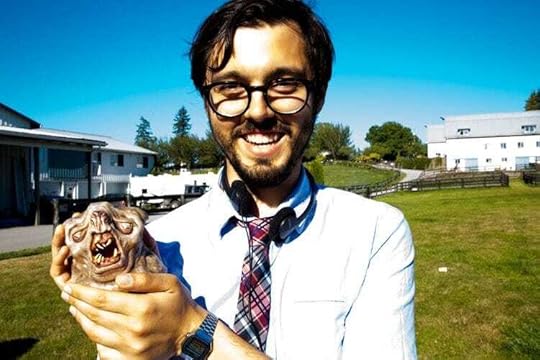 Me with a creature head that ended up a deleted scene.
Me with a creature head that ended up a deleted scene.Does the thought of someone calling me a Renaissance man make you sick to your stomach? If not, you're gonna love this wide-ranging conversation with one of my favorite culture writers/film critics, Sonny Bunch.
We talk about The Cleanse finally arriving on Blu-ray this week, voice directing for (REDACTED), dialogue editing for Big Mouth, and yes — Sonny is one of the small group of people who have read my novel.
Many people are saying this is a podcast for the ages. Please enjoy below or, better yet, subscribe to The Bulwark Goes To Hollywood podcast. It’s a great one.
 The Bulwark A Movie Isn't Real Until You Can Hold ItThis week, I’m joined by Bobby Miller, the writer/director of The Cleanse, to talk about the film’s long and winding path to a Blu-ray release. (You can buy it at Amazon or for five bucks less at the great DiabolikDVD.) We discussed getting that film made, the struggle to sec… Listen now2 hours ago · Sonny Bunch
The Bulwark A Movie Isn't Real Until You Can Hold ItThis week, I’m joined by Bobby Miller, the writer/director of The Cleanse, to talk about the film’s long and winding path to a Blu-ray release. (You can buy it at Amazon or for five bucks less at the great DiabolikDVD.) We discussed getting that film made, the struggle to sec… Listen now2 hours ago · Sonny BunchThanks for reading Bobby Miller Time! Subscribe for free to receive new posts and support my work.



